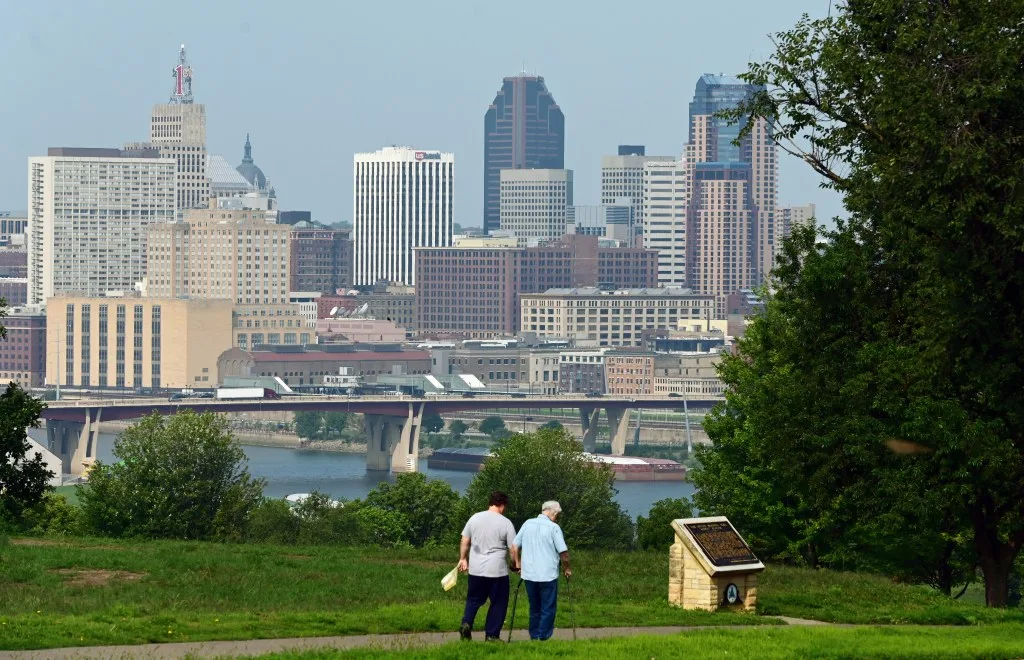
While many activists have been talking about reparations for years, the term caught fire in 2020 during the racial uprising following George Floyd’s murder in Minneapolis.
In some cities, including St. Paul, the conversation about reparations caught fire in local government. In 2021, the city of St. Paul launched a trial committee focusing on reparations for American descendants of chattel slavery. This year, that committee became a permanent commission, appointing 11 people to advise the mayor and city council on how to best approach reparations in St. Paul.
For the past 10 weeks, I’ve been reporting on reparations in St. Paul, both in and out of the government. My goal was not to convince anyone of anything, but rather to expose more people to the discussions happening in the city around the topic.
Here are the four lessons I learned on the job:
Lesson 1: Paying reparations doesn’t look like one thing
Before taking on this project, I had only really known reparations as the 40 acres and a mule that formerly enslaved Black Americans were supposed to receive after the Civil War. But clearly, that system is outdated.
The modern “40 acres and a mule” is much more diverse. Property is still on the table, and there’s an increasing number of social services homing their focus on homeownership for American descendants of chattel slavery.
But there are other approaches to this in the 21st century. Education is one, such as scholarships for students who come from marginalized backgrounds. Just this year, Minnesota passed the American Indian Scholars Program, which would funnel $24 million toward tuition for American Indian students at public universities.
Reparations today isn’t necessarily a lump sum of money paid directly to those harmed, although that is one approach. Reparations can also be pouring money into services so as to better serve those who have been historically underserved. In California, a reparations task force proposed a list of non-cash reparation efforts, which included eliminating bias in standardized testing, revising voting legislation, and reforming law enforcement practices.
Lesson 2: People are weary of the word “reparations.”
I’d often sit down with organizations or government officials and ask them if they’d consider their work to be reparations. And while their work almost always was directed to benefit American descendants of chattel slavery, most people would say no.
The reason most people gave is that they felt that their contribution to helping build Black wealth and well-being was not enough to be considered reparations, as it wasn’t fully repairing the damage done.
The other reason I suspected was that people didn’t want to scare anyone away. The word “reparations” can get a big reaction out of many Americans. In a recent study, a political science professor found that two-thirds of Americans he polled were against cash payment for descendants of slaves – not because of the financial cost, but because they didn’t believe the descendants deserved reparations. During the past 10 weeks, I encountered those opinions weekly in my inbox.
When I spoke to Black Lives Matter activist Trahern Crews, he said that people shy away from the word ‘reparations’ because they’re worried it isn’t palatable. Instead, they’ll opt for terms like “racial equity.” But during his work with the city creating the reparations commission, he refused to use a different word.
“I think some people think that if they don’t use the word ‘reparations,’ things are easier to get by. But I think that’s untrue, we just have to continue to educate people about reparations issues,” Crews said during our interview.
Lesson 3: Reparations are messy.
The majority of my articles this summer centered on American descendants of chattel slavery. And for good reason – although located in the “free North,” Minnesota has a history of enabling slavery among Southerners who moved here, implementing racial covenants in housing deeds, building Interstate I-94 through the Rondo neighborhood, etc.
But descendants of slavery are not the only group of people whi have faced racial oppression in Minnesota. I found that it was nearly impossible to have a complete conversation about reparations without recognizing that the discussion was taking place on land that was forcibly taken from Dakota tribes, and has yet to be returned. Like American rapper KRS-One said, “there could never really be justice on stolen land.”
But when you combine these two conversations about reparations, things get complicated. For example …
During his work on the St. Paul reparations committee in 2021, historian Yohuru Williams noticed it was really hard for a lot of people to have conversations about joining the fight for reparations between American Indian and Black communities.
“Some people see this as a conversation about ADOCS, and I understand and appreciate that. But I think the Indigenous and the Black experience can’t be disentangled. You could reduce all of American history to stolen land and labor,” he told me during our interview.
Lesson 4: We need to learn our history.
I’m a college-educated person who considered themselves to have a pretty good grasp on racial injustice in Minnesota. But with every article I wrote, I found myself learning something I didn’t know.
Almost everyone I talked to for this project – from activists to politicians to community elders – told me that we Minnesotans generally lack knowledge of the discrimination that has occurred here, dating back to the 1800s (an of national history, too, including the broken promise of 40 acres and a mule). That makes it hard for them to make their case for reparations.
But when people do understand what has happened here – the forcible removal of Dakota tribes from their land, the laws that allowed slavery at Fort Snelling, the destruction of generational Black wealth in Rondo and other manifestations of national policy and culture – they are able to better make up their minds. Some people will still reject reparations. But many of the folks I spoke to told me that through education, they witnessed people change their minds and begin to understand, if not accept, the idea of reparations in St. Paul.
Isabel Saavedra-Weis is a born-and-raised Minnesotan and a recent graduate from Macalester College. As a ThreeSixty Journalism alum, she continues to advocate for diversity in local newsrooms and community story-telling. This is her third summer writing for the Pioneer Press.


